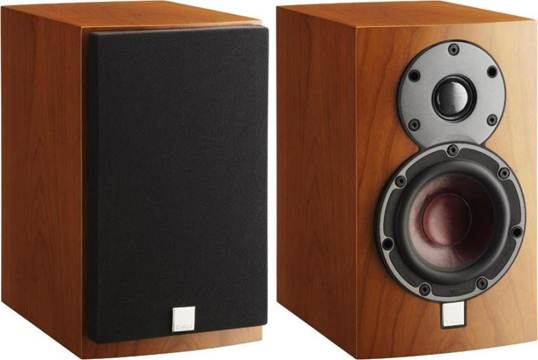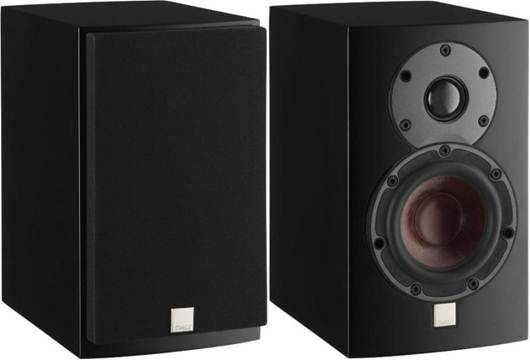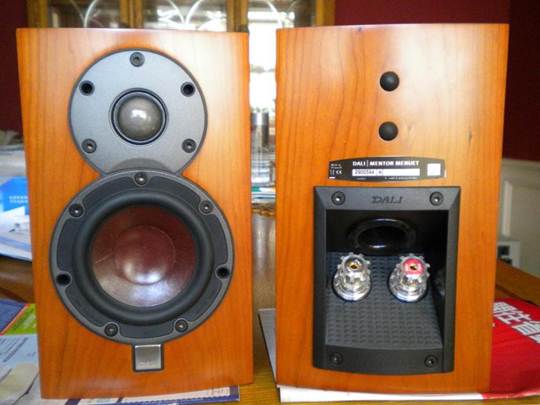The littlest member of Dali’s Mentor family is very small
indeed, but as we discover it can produce a big performance
Doing things in its own particular way is very much what the
Dali brand is all about. Examples include extensive use of ribbon tweeters and
the development of a wood fiber material that appears in almost all of the
ranges the company produces. To this end, there are some Dali design features
that generally stand out from the pack. Chief among them is that with many of
its products making use of both a ribbon tweeter as well as a conventional
dome, Dali stand mount speakers are often among the largest in their category. So
it is with the Mentor range, which sits towards the middle of the Dali lineup.
The great majority of the range is equipped with two tweeters and has cabinet
dimensions to suit.

Stand mount
loudspeaker
The exception to this is right at the bottom of the Mentor
family tree. The Mentor Minuet is not only small for a Dali speaker, but tiny
by any usual little speaker standards. The petite Dali sits as part of the
Mentor range, but also part of a distinct family of products in its own right.
To this end the Minuet has some trademark Dali features like
the wood fiber mid bass driver – which differs from a conventional paper driver
thanks to the introduction of wood fibers into the paper pulp prior to forming
and doping them. At 100mm, this is smaller than the ones used elsewhere in the
Mentor range. As the cabinet is only 25cm high, the Minuet is fitted with a
single tweeter – in this case a 28mm soft dome unit used in the rest of the
range, which covers the full upper frequency spectrum rather than handing over
to a ribbon. The cabinet is rear ported, but the port is built into the recess
where the speaker terminals are fitted. This means that the port can be angled
downwards to allow the Dali to be mounted close to – or indeed on – walls. The
rear of the speaker also features a pre-drilled mount for a dedicated wall
bracket.

The cabinet is
rear ported, but the port is built into the recess where the speaker terminals
are fitted.
This ability to be used near walls extends to the entire way
that the Minuet has been voiced and the Dali can make use of them to augment
the bass response. Given that a speaker as dinky as the Minuet is going to have
limits to the frequency extension it is capable of, this makes a considerable
degree of sense, although the UK has never historically been big on wall
mounting. By the same token, the port arrangement means that the Minuet is
unlikely to mind being placed on a stand near a wall either.
As a half member of the Mentor family, the Minuet is
slightly different in appearance to the rest of the range, but in some ways is
none the worse for that. It does without a separate front baffle to the cabinet
and is instead veneered all the way around. This gives the Dali a faintly retro
appearance, but not shamelessly so and the Minuet is unlikely to offend in most
domestic situations. The review pair are supplied in a cherry veneer, but a
white and black satin finish are also available. The fit and finish is extremely
good as well. Although the cabinets are fairly small, they feel solid and well
assembled with excellent quality veneering and substantial speaker terminals
helping the Minuet feel worth every penny of the asking price.

The Minuet isn’t
just small in the Mentor range, it’s also tiny compared to most rivals
As wall mounting is not a practical proposition for the
review, the Minuets are placed on a pair of Sound style Z60 stands and tested
with a Naima Superfast and Cambridge Audio 851A with source equipment courtesy
of a Naima ND5XS and Paragould Zodiac. From the very start of listening, the
Dali’s subvert expectations. Whatever trickery Dali might claim goes into the
Minuet cannot prevent you from subconsciously expecting it to sound small. To be
clear, the Dali is still not going to shake buildings to their foundations or
double up as a PA speaker, but it sounds far bigger than a model with a frontal
area smaller than a piece of A4 paper should.